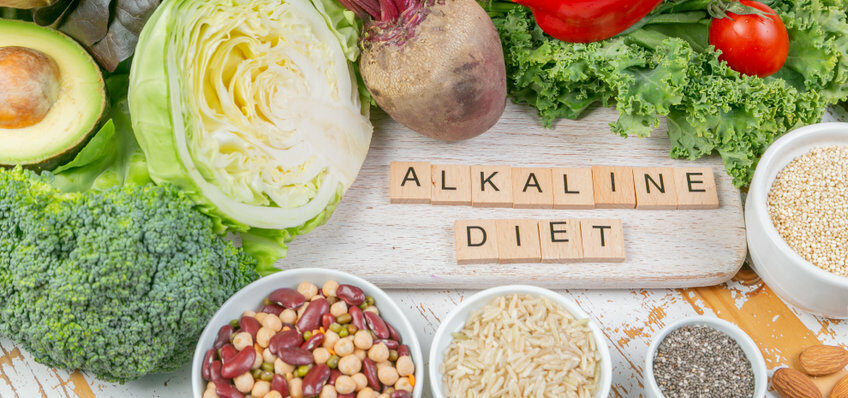
Whether or not you or someone you know has tried them, you’ve likely seen special drinks marketed as “alkaline” at the grocery store. As part of the alkaline diet, these products position themselves as a way to improve your overall health, prevent certain diseases, and of course, live longer. However, with people flocking to this diet over the years, many wonder whether it truly works or if it’s just another marketing gimmick? Since it is a diet that focuses on regulating the pH of the body, it’s vital to look at the science behind it to make an informed decision. In this article, we’ll cover what the alkaline diet is, how it classifies food, and the research surrounding this diet.
What is the alkaline diet?
Otherwise known as the alkaline ash diet or the acid-alkaline diet, this eating pattern hinges on the idea that you can alter your body’s pH through the foods and drinks you consume. The “ash” part of the name comes from the belief that the body’s metabolism is akin to fire, using food to feed its flames. However, the remnants of the food, or metabolic waste, are viewed as ash which can be alkaline, neutral, or acidic. Proponents of this diet subscribe to the idea that this waste affects your body’s acidity. Within this scope, it is believed that acidity makes you prone to disease while alkalinity protects your body.
Alkaline versus acidic foods
Acidic ash¹ is left behind by foods containing phosphate, sulfur, and protein, whereas those that leave behind alkaline ash have calcium, potassium, and magnesium. According to this diet, foods are divided into the following categories:
- Alkaline: fruits, vegetables, nuts, legumes
- Neutral: sugars, starches, natural fats
- Acidic: dairy, eggs, meat, poultry, fish, grains, alcohol
Does pH affect our overall health?
Although maintaining a balanced diet is essential, the body already has systems that regulate pH naturally, including the kidneys² and the respiratory system. Furthermore, it is important to highlight that the food we consume affects the pH of our urine — not our blood. Even if you eat something very acidic, like a large steak, your urine will only remain acidic for several hours afterward or until your body balances its pH. As a result, the pH level of urine is not the best indicator of the entire body’s pH or the overall health of a person. Nonetheless, that doesn’t stop people from claiming that the alkaline diet can cure cancer.
Alkaline diet research
Currently, there is no scientific evidence³ that proves that the acid-alkaline diet can cure cancer. In fact, many experiments have shown that cancer cells can grow in an alkaline environment⁴ of 7.4 pH. Though tumors grow more rapidly in acidic environments, that environment is perpetuated by the tumor⁵ itself. Regardless, one potential benefit³ of the alkaline diet is weight loss, especially if it is a low-protein diet, although it may come with other health risks. All in all, eating a wide range of foods and maintaining, and varied diet can ensure people get more vitamins and nutrients needed for essential processes in the body.
References
- Tobey, J A. “The Question of Acid and Alkali Forming Foods.” American Journal of Public Health and the Nation’s Health, U.S. National Library of Medicine, Nov. 1936, https://www.ncbi.nlm.nih.gov/pmc/articles/PMC1562900/.
- Peters, Melanie. “pHear pHactor: Debunking the Alkaline Diet.” UC San Diego Health, University of California San Diego, School of Medicine, Apr. 30 2019, https://health.ucsd.edu/news/features/Pages/2019-05-06-pHear-pHactor-debunking-the-alkaline-diet.aspx
- Villines, Zawn. “Does the alkaline diet work?” Medical News Today, Healthline Media, Jan. 24, 2019, https://www.medicalnewstoday.com/articles/324271
- Bonjour JP. Nutritional disturbance in acid-base balance and osteoporosis: a hypothesis that disregards the essential homeostatic role of the kidney. Br J Nutr. 2013 Oct;110(7):1168-77. doi: 10.1017/S0007114513000962. Epub 2013 Apr 4. PMID: 23551968; PMCID: PMC3828631.
- Moellering RE, Black KC, Krishnamurty C, Baggett BK, Stafford P, Rain M, Gatenby RA, Gillies RJ. Acid treatment of melanoma cells selects for invasive phenotypes. Clin Exp Metastasis. 2008;25(4):411-25. doi: 10.1007/s10585-008-9145-7. Epub 2008 Feb 27. PMID: 18301995.
Ashuni Pérez is a writer in the culinary, as well as health and wellness industries. With a background in teaching and digital media, she loves to learn and help others discover more about their food, where it comes from, and how best to prepare it. A foodie through and through, she is always searching for new recipes and the freshest ingredients.











Leave A Comment